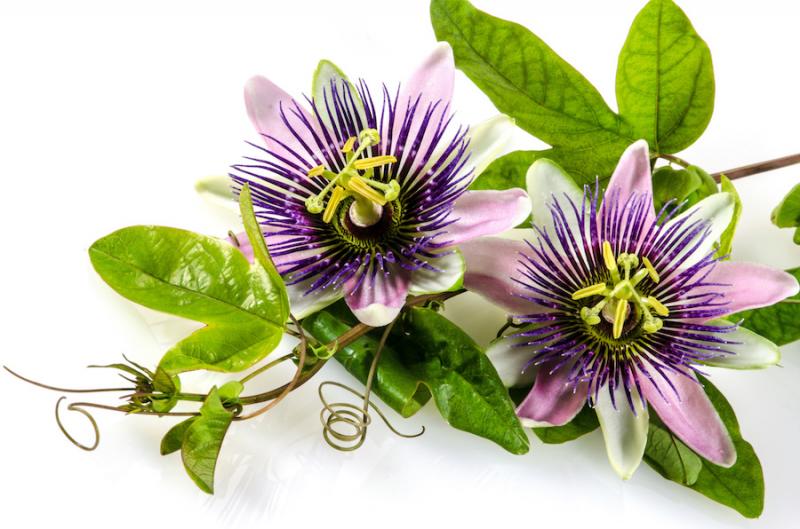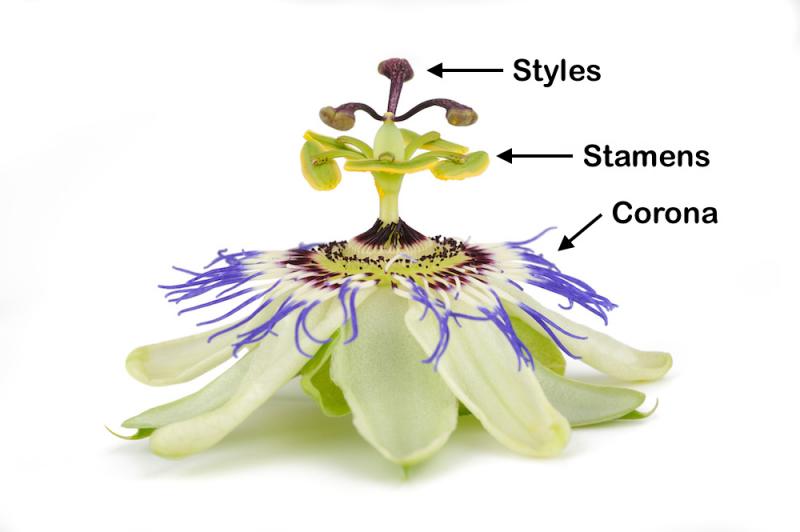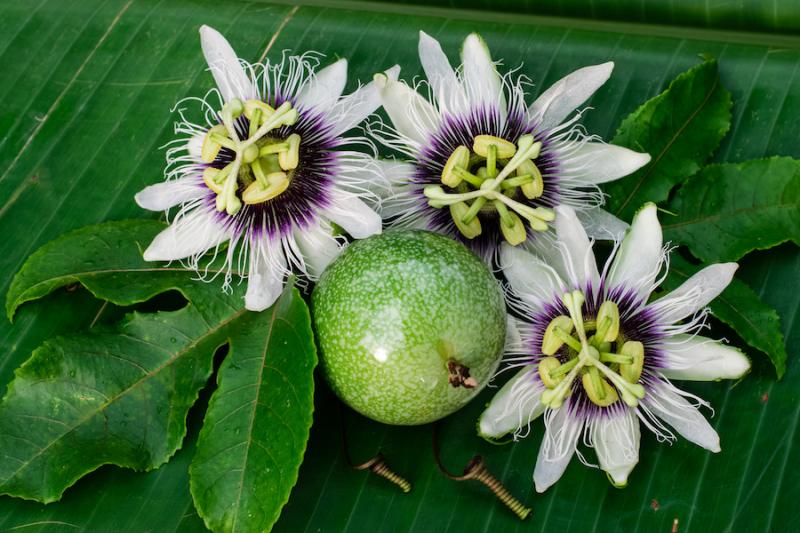 If you only know herbs from labels on a bottle, you’re missing a lot. Passionflower is a perfect example. The flowers on this plant are amazing to look at. Spanish explorers saw a symbolic relationship between the patterns in these flowers and the suffering (or passion) of Christ, hence the name. They saw the three styles as the three nails, the five stamens as Christ's wounds, and the long, thin fibers of the corona as the crown of thorns. The passion they saw in passion flower represents suffering, an appropriate symbolism for a plant that helps relieve stress, pain, and insomnia.
If you only know herbs from labels on a bottle, you’re missing a lot. Passionflower is a perfect example. The flowers on this plant are amazing to look at. Spanish explorers saw a symbolic relationship between the patterns in these flowers and the suffering (or passion) of Christ, hence the name. They saw the three styles as the three nails, the five stamens as Christ's wounds, and the long, thin fibers of the corona as the crown of thorns. The passion they saw in passion flower represents suffering, an appropriate symbolism for a plant that helps relieve stress, pain, and insomnia.
The species used in Western herbal medicine is Passiflora incarnate (pictured above), also known as maypop or apricot vine. It is not the only species used as medicine; other species in the Passiflora genus that have been used as medicine include P. foetida, used in Argentina to treat epilepsy, P. quadrangularis, used throughout the Caribbean as a sedative and pain reliever for headaches, and P. rubra, used in Jamaica as a morphine substitute. There’s also P. edulis, the species known as passion fruit, which is used to make juice, although the fruits of P. incarnate are also edible. The species pictured below, P. caerulea, is from South America and clearly shows the flower's interesting structures as discussed above.
Relaxing Antispasmodic
 Passionflower helps to relax motor nerves and reduce muscle spasms making it an effective remedy for anxiety, stress, nervous agitation, and insomnia. It is particularly good for mild to moderate anxiety due to worry or excess work. As an antispasmodic, passionflower can ease pain associated with tension and stress. This includes tension headaches and pain due to muscle spasms. Its antispasmodic effects mean it can be helpful for bronchial spasms and asthma. It can also ease pain from neuralgia.
Passionflower helps to relax motor nerves and reduce muscle spasms making it an effective remedy for anxiety, stress, nervous agitation, and insomnia. It is particularly good for mild to moderate anxiety due to worry or excess work. As an antispasmodic, passionflower can ease pain associated with tension and stress. This includes tension headaches and pain due to muscle spasms. Its antispasmodic effects mean it can be helpful for bronchial spasms and asthma. It can also ease pain from neuralgia.
Although it's helpful for sleep, it usually works best as part of a sleep formula, which can include herbs like hops, valerian, scullcap, and kava kava. It's particularly helpful in calming down the mind when a person can't stop thinking. It combines well with GABA for this purpose.
Passionflower is a particularly good nervine for the heart. It’s helpful for calming heart palpitations and reducing hypertension that is associated with stress. It may be helpful for regulating the heart rhythm and is a good ingredient to have in a cardiac formula when there is general anxiety.
It has a settling effect on the digestive system, which can be upset by stress and anxiety. It can ease chronic hiccups, for example. For digestive upset, it combines well with catnip or chamomile.
Specific Indications for Passion Flower
 Some of my herbalist friends have given more specific indications. These indications are good clues as to when passionflower is the perfect nervine for a stressed, anxious person.
Some of my herbalist friends have given more specific indications. These indications are good clues as to when passionflower is the perfect nervine for a stressed, anxious person.
Thomas Easley says passionflower is indicated when “your thoughts are like two squirrels chasing each other tails. You lay down at night and think of one thing and then another, and an hour later your wide awake and back at the beginning thought.” If this describes you, passionflower might be a good remedy to help you get to sleep.
Matthew Wood gives some other indications. He says it’s useful for “chatterboxes who talk all the time about themselves, family and friends.” He also says it helps people with the opposite tendency “stoic persons who seldom talk about themselves.” These are good indications when passionflower may be the perfect remedy for a person who is tense or anxious.
The passion of life includes both the positive, those things we strongly desire, and the negative, the pain and suffering we experience. When someone is experiencing the latter remember the symbolism of passionflower and see if this remedy can help them feel relaxed, calm, and peaceful again.
Steven's Articles
-

-
Eucommia Bark
A superior tonic that promotes kidney, structural,…
January
-

-
Goldenthread, Phellodendron, and Yellow Root
Three herbal remedies containing the infection-fighting…
-

-
Teasel
A traditional herb for healing bones and joints…
-

-
Barberry and Healthy Personal Boundaries
A thorny shrub for fighting infections and supporting…
December
-

-
The Evidence for Berberine
A yellow alkaloid found in traditional infection-fighting…
-

-
The Sensible Use of Caffeinated Herbs
Kola nuts, guarana, and yerba mate and other herbs…
-

-
The Health Benefits and Problems with Coffee
This popular caffeinated beverage can be beneficial…
October
-

-
Understanding Caffeine & Cellular Adaptation
Preserving the power of caffeine's buzz and the…
September
-

-
Horseradish
A pungent spice for aiding protein metabolism…
-

-
Banaba or Crepe Myrtle
A beautiful tree from Southeast Asia whose leaves…
August
-

-
Monkeyflowers
Flower essences to help see ourselves more clearly…
-

-
Mariposa Lilies
Strengthening the bond between mother and child…
-

-
The Noble Bay Leaf
A common kitchen herb for aiding digestion and…
-

-
Epimedium: Horny Goat Weed
A circulatory stimulant and kidney yang tonic…
July
-

-
The Medicinal and Nutritional Benefits of Apricots
A nutritious fruit and valuable medicinal seed for coughs

